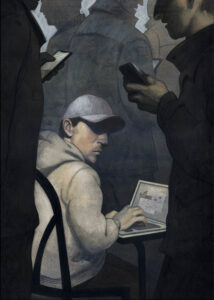Hello, I’m Oleksandr.
I’m a so-called troll hunter, and part of an online army of people fighting disinformation and propaganda in my home country, Ukraine.
Our enemies are Russian-controlled bots, nationalists, and politicians who throw dirt at anything to do with our national identity and territorial sovereignty.
As you might know, Ukraine and Russia haven’t been on friendly terms for a while—at least since the latter invaded the region of Crimea in February 2014. With the threat of one of the world’s biggest military powers looming upon us, Ukraine has, as reported by the Atlantic Council think tank in 2021, “been fighting for its survival as an independent state.”
The physical threat has gone hand-in-hand with online and offline propaganda aimed at discrediting our culture and politics—a tactic known as “hybrid warfare.” Russia spreads fake news, both at home and internationally, that seeks to delegitimise our government and spread fear.
In 2019, the Ukrainian debunking initiative Stopfake listed the main narratives nurtured by Russian propaganda. They included “Ukraine as a fascist state, its army as either brutal or weak, discrediting Ukrainian authorities or depicting the country as a failed state.” Ukraine, as the policy forum Wilson Centre has defined it, is “the laboratory for Russian disinformation campaigns.”
A couple of months ago, I stumbled upon an unexpected opportunity to do something about this…
14th July
It was one of the hottest days of summer, and I didn’t feel like doing anything, apart from sitting behind my PC and wasting time looking at memes and the news. I’ve always liked to be on top of what’s going on in Ukraine and leave lots of comments.
Sometimes my comments start a discussion, and I have to admit I get a kick out of that. The last thing I expected was that this would get me headhunted for a new adventure. I was lying in bed staring at my phone when I received a notification. I’d been invited to join a Telegram group chat of 150 people.
“What’s this about?” I thought to myself.
Soon enough, I learnt it was a group of troll hunters committed to fighting Russian disinformation together. They raided pro-Russian Telegram channels, flooding their comments and mass reporting them. The group admins explained everything: from how to create multiple accounts, to how to use malicious software in order to break down channels, websites and expose the people spreading fake news.
I felt proud they’d picked me to join them. Plus it was the summer holidays, so I had nothing better to do. I accepted the invite.
15th July
On my first day among the troll-hunting ranks, I got to know the other members of the group.
The first guy I talked to lived in the west of Ukraine. Like me, he was a university student, and had also just been recruited. Except he had previous experience fighting internet trolls. He told me it was his hobby and that he found it energising.
The next person I spoke to admitted he used to work as an online scammer, pretending to be a girl to trick men on dating websites. It’s an activity I can’t support nor understand, but he said he made a decent income off of it before he quit.
Each of the members had their unique hobbies and personalities. It was a diverse community, including conservatives and liberals, LGBTQ+ and straight people, sons and daughters, brought together by the shared desire to defend our culture from outside interference.
Then the co-founder of the group informed us to get ready to raid our next target. Here was my first battle.
We made a plan. All active users should be online between 12-1 pm and flood the open comments of our target’s Telegram channel, then report it. We used GIFs, images and videos with explicit content provided by our channel’s founders that go against Telegram’s Terms of Service.
After an hour of raiding, we mass reported the channel for flooding and explicit content, and it got banned in a day. My first success!
16th July
On the next day, the cycle repeated: we chatted amongst ourselves and discussed our results. We talked about our next target, and how we could improve our concerted action. Until the news reached us.
A comrade from another troll-hunting branch had been arrested for using malicious software to access information regarding the Russian anti-Ukraine disinformation campaign.
Although he’d used illegal hacking methods, he had uncovered documents suggesting Russia’s involvement in a hybrid war against Ukraine. This was devastating news, but we had to keep going. We had lost the battle, but not the war.
17th July-24th July
The week after my first victory, we raided ultra-nationalist Russian group chats that were pushing anti-Ukraine propaganda.
After seven days of late-night raiding, spamming and flooding, the groups were brought down for good. Their members dispersed, not to be seen again for a while. There were rumours going around that some of them had been sentenced to jail.
I did this for two months straight, spurred on by the feeling that I was contributing to a cause I deeply believed in.
27th August
In the late summer, discussions about the future of our group took place. The leader announced that he would be kicking “unreliable users” out of the chat while recruiting new admins to coordinate and support our action. I asked him why.
He said that it was necessary for the safety of the rest of us. Chats like ours are often infiltrated by spies or police officers who are assigned to keep an eye out. That’s also why there were certain things that we never spoke about, like meeting each other offline. We were afraid of getting arrested.
I felt like the founders were pitting us against each other, and started to think about leaving the group, also for personal safety reasons. Some of my comrades were committing crimes, leaking people’s personal information like their passport or identification number, addresses and contact details. This made me uncomfortable. However much I believed in the ends, I started to question the means.
28th August
The next day, our software engineer—who was responsible for creating malicious software—asked us to find information on
a person. They had been promoting the separatist movement in the southern region of Ukraine and spreading disinformation by repeating Kremlin-fabricated propaganda.
Someone linked their Facebook account, and by the end of the day, the software-engineer had hacked into it and knew their address, workplace, and passport number.
That’s when I realised that, in the fight against the monster, we were starting to look more and more like that monster ourselves.
I still wanted to fight my enemies legally, and there are many ways to do so. The software engineer, for instance, should have reported this man—not stolen his private data.
That night, I couldn’t sleep. I was kept awake by the fear that I hadn’t picked the right team to fight for a good cause. I still admired these people—with families, responsibilities and normal lives—for their dedication to confront what they perceived as evil in spite of their daily commitments. But I didn’t like their methods.
So, I bailed.
24th September
As of now, I’m retired. Sitting at my computer, I think back to my troll-hunting days, knowing that they are not over yet. I hope I can find another group that doesn’t do anything illegal.
Having fixed my sleeping routine, which had been compromised by all that night raiding, I now have more time to volunteer. I’m part of a team of people who gather supplies and send them out to the soldiers, defending our independence and self-determination in the trenches at the physical frontiers of the war with Russia.
This is a much healthier activity for me. I get to spend time with wonderful people, talk to them about the bright future of my country and how great it will be when the war is over.
After all, we all want to live in a free country where each of us is safe and happy. It takes effort, but the results will be worth it




